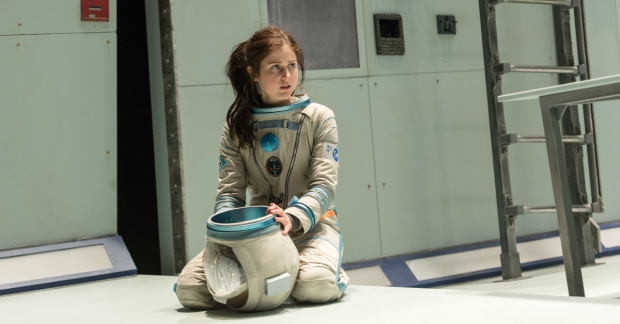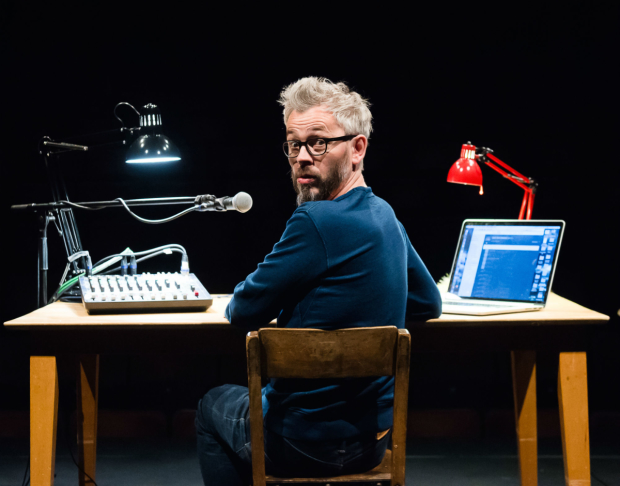Playwrights should be predicting the future

© Manuel Harlan
Ella Hickson‘s Oil ends 35 years from now. Starting in 1889, it hurtles through history, burning through the Oil Age, and ends pretty much as you’d expect – in a shivering, powerless world.
What struck me, watching Hickson peer into her crystal ball, was how many new plays zoom ahead. Alistair McDowall‘s X is set on Pluto decades – if not, centuries – from now, while plays like Tomcat by James Rushbrooke and Nick Payne’s Elegy invent imminent medical techniques to mull over their ethics. Caryl Churchill trotted through an impending, absurdist apocalypse in Escaped Alone : torrential rain and smartphone shortages. It’s not just us Brits either. Think of the "post-electric" America in Anne Washburn's Mr Burns or the vast virtual reality of Jennifer Haley's The Nether.
Historically, new writing has tended to examine the present; the way we live now
Looking back, I think the first time I clocked a far-flung future was in Earthquakes in London. Mike Bartlett‘s time-hop ends in 2525 with a kind of messianic myth and a world that, unlike the one in Oil, has realised the error of its ecological ways. Bartlett skips ahead quite a bit actually: 13 imagines coming revolution and Game a dystopian Britain.
It’s not an entirely new phenomenon. Back in 1967, Ann Jellicoe plonked a spaceship onstage and forced humans to flee environmental catastrophe in a bizarre, but prophetic play called The Rising Generation. Philip Ridley's Mercury Fur and Mark Ravenhill's The Cut feel futuristic as well. Nonetheless, it's a recent enough thing that, as late as 2010, the Guardian could still lament the lack of sci-fi theatre – and not for the first time. No-one could say the same now.
Historically, new writing has tended to examine the present; the way we live now. Theatre’s a present-tense medium, one that happens in the here and now, and playwrights have tended to use that to their advantage: pressing contemporary issues and political points.
Perhaps today’s theatre can make the future seem credible
Many do so by looking to the past: James Graham‘s This House, for example, due in the West End next month, returned to the coalition government of the mid-Seventies to better understand the one in power when it premiered. It’s a classic technique. The Crucible‘s the most obvious example: Senator McCarthy’s witch hunt reflected in Salem, 260 years earlier. This, after all, is what we do with classics. We find contemporary resonance in yesterday’s plays: Brexit in John Osborne, recessions in Chekhov, unjust wars in the ancient Greeks. We’re accustomed to seeing the past onstage. All those ruffs and stockings normalise an aesthetic.
The future, by contrast, belongs on screens or in books. It’s Fritz Lang and George Lucas, Spielberg and Scott. It’s Huxley and Orwell and HG Wells. Of course other writers followed in their footsteps. The former had budgets; the latter, imagination. They could create the future. How could theatre compete? Freed from the constraints of fourth-wall realism, more comfortable with metaphor than mimesis, perhaps today’s theatre can make the future seem credible.
Maybe it’s another set of conditions – the practice of playwriting. There’s a pressure on plays to remain relevant, but theatre isn’t the rapid-response medium we like to think. Development processes have become drawn out and it takes longer to get from commission to production. Oil itself had six years of refining. Write about the world you see out your window and there’s a danger you go out of date. Imagine a future and, well, it’s still all to play for. What better way to remain relevant?
The future’s up for grabs – and playwrights are grabbing it
Actually, the futures we see onstage reflect the present – often better than plays set today. At a moment when we’re resigned to environmental collapse, it’s striking how many of these plays present doomsday scenarios. Those that imagine new technologies reflect the pace of change – so quick that it can feel as if we’re living in the future we saw as children, all touchscreens and self-driving cars. This is also a spectacularly uncertain moment in history, a time teetering on the edge of a new era. Old orders seem broken, but new ones are yet to replace them. This year, in particular, feels like a tinderbox ready to explode with unpredictable consequences. The future’s up for grabs – and playwrights are grabbing it.
That begs a question – one that’s a big issue in sci-fi circles. Who gets to write the future? It’s worth clocking the list of writers mentioned – all of them white. It’s one of the reasons Tajinder Singh’s written North Country, which opens next week at Freedom Studios in Bradford – a vision of the city after a devastating plague.
We encourage playwrights of colour to write stories of now, a way of ensuring representation, and to rewrite history, correcting its blind spots. Where August Wilson’s Century Cycle led, Suzan Lori Parks has followed with Father Comes Home From the Wars. Hamilton‘s driven by the same principle: fiction as a corrective.
However, fiction also shapes the future. Artists' visions of tomorrow’s world aren’t simply prophetic, they’re influential. Playwrights imagine the apocalypse in a bid to avert it. They invent worlds as warnings, for the sake of better tomorrows, and time and again, we drive towards the futures we saw on stage and on screen. Everyone needs a stake in that. The future belongs to us all.











